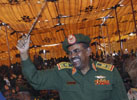
It’s official: Sudan’s National Electoral Commission today declared a victory for President Omar al-Bashir in what’s been dubbed the country’s “first democratic elections” in over two decades. The outcome, of course, is no surprise, given that Bashir was running virtually unchallenged. (I find it strangely contradictory how so many reports about Bashir’s victory lead off by writing of Sudan’s “first multi-party election” in practically the same breath as they note that Bashir’s potential challengers boycotted, leaving the longtime dictator as the only plausible candidate.)
The electoral commission also announced today that incumbent president of southern Sudan, Salva Kiir, won reelection in a landslide, receiving nearly 93 percent of votes. The results confirm that President Kiir will lead the semi-autonomous South to its self-determination referendum in January 2011.
Enough’s Maggie Fick in the southern capital of Juba had this to report about the reaction she witnessed at the airport when the final results of the presidential election were televised:
Not to project my opinions onto the airport waiting lounge crowd too much, but people seemed pretty nonplussed by the news, as it came as no surprise that Bashir and Salva Kiir would respectively win big, but I think people were genuinely surprised and pleased at the fact that the SPLM’s (withdrawn) candidate Yasir Arman took 2 million votes. A Sudanese friend on the flight with me said this was "because of ignorance," but another person (a lawyer from Khartoum) I met in the airport said it was a good sign for Sudan that Yasir garnered so many votes. Any way you look at it, the intense confusion surrounding the position(s) of the opposition parties immediately before the elections, and the SPLM’s late decision to withdraw its presidential candidate, left Sudanese voters with little choice but to vote for Bashir.
It’s hard to say whether the 2 million voters who chose Yasir did so out of protest (against Bashir) out of support (for the SPLM) or out of ignorance (they hadn’t heard Yasir had been withdrawn). But the fact that Bashir got ONLY 68 percent of the vote after a thoroughly rigged process might just say something about the future of Sudanese politics. Thanks to what Girifna and other popular pro-democracy groups started during this electoral process, there’s hope that the next elections could be more competitive and perhaps even some kind of vehicle for democratic change.
It has been 13 days since Sudan’s elections, and during this tenuous phase marked by isolated cases of violence and mounting reports of fraud, the Obama administration has been remarkably unresponsive. This month’s unfree and unfair elections were just one development that should have tipped off the administration to the need to rethink its policy toward Sudan – particularly in light of the administration’s pledge to evaluate its policy “based on verifiable changes in conditions on the ground.” Yet high level engagement from the administration is conspicuously missing.
In reaction, the Sudan Now coalition began running a series of ads in the Washington Post and the Washington Express today and in Politico on Wednesday that call on Secretary of State Clinton and U.N. ambassador Susan Rice to personally take the lead in overseeing the U.S. policy on Africa’s largest country. As initial reports emerged over the weekend of fighting along the North-South border that left 58 people dead – in an area bound to be a powder keg in the lead-up and aftermath of the southern referendum next year – it’s clear that leadership on Sudan from Secretary Clinton and Ambassador Rice could come none too soon.
Photo: Sudanese President Omar al-Bashir, in full military dress, waves to supporters at a military hospital in Khartoum (AP/Abd Raouf)

